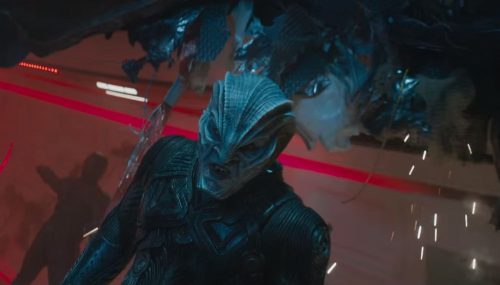
Star Trek Beyond soared into theaters last weekend under the weight of 50 years of expectations. Some were notably lower after the mess that was 2013’s Star Trek: Into Darkness. Some can never be met; those belong to the old guard who would rather the movies be more like (one of) the series. When Justin Lin was announced as Beyond’s director, there was a certain amount of groaning online: “It’s just going to be Fast and Furious in space!”
Well, yes, and that’s a good thing. Star Trek, as has often been said, was intended to be progressive, and was a forerunner of diverse casting. Lin, who re-invigorated the Furious series, is in that sense par for the course set all those years ago: His Furious movies present a team of equals, a diverse group of scoundrels who call each other family and pull each other through. They run in direct opposition to the one-white-male hero who tiresomely dominated action films for so very long.
Also, Lin knows how to shoot one hell of an action sequence. But what’s often overlooked about Lin is that he also excels at the perfectly timed reaction shot, the glimpse at someone’s face that tells you exactly what’s going on. Lin peppers his breathless film with such inner revelations, and each one — particularly a shot of Sulu (John Cho) worrying about his family — is more effective than any of the wails of rage at the end of Darkness.
Beyond is a very different movie — more fun and simultaneously a more grownup take on the characters, some of whom are experiencing an early space-life crisis. Kirk (Chris Pine) isn’t sure he wants to continue as captain; three years into a five-year mission, he’s complaining that things feel “episodic.” Spock is torn between his place on the Enterprise and the good he could do on New Vulcan.
Beyond is about their friendship, but it remembers that McCoy (Karl Urban, at his best) is also central to this brotherhood. Dry and perpetually put-upon, Urban’s McCoy has different but equally vital relationships with Kirk and Spock. The rest of the crew have smaller roles, but writers Simon Pegg (whose Scotty unsurprisingly gets some great lines) and Doug Jung make room for everyone — though Zoe Saldana’s Uhura feels underused.
That’s the point of this crew: They’re all needed. As is Jaylah (Sofia Boutella), the staff-wielding loner they meet on a planet in the middle of nowhere. Fierce and pragmatic, she’s an absolute delight.
Jaylah escaped from a fellow named Krall (Idris Elba), who plays on Kirk’s heroic tendencies in order to lure the Enterprise to his rocky world. Krall’s nefarious plans fuel Beyond’s plot, which tumbles from action sequence to glorious action sequence, but his motivation shares something graceful with Kirk and Spock’s own quandaries.
That pull between who you are and who you might be, or might’ve been, gives this Star Trek more heart and heft than the past two in these new films. It’s not that the future of the crew is ever in doubt. It’s that some people have to continually choose to be who they are. The process isn’t finite. Sometimes you choose the wrong thing. But in Justin Lin movies, things work out best when you choose your family, you choose to fight and you choose to change for the better. (Regal Valley River, Cinemark 17)